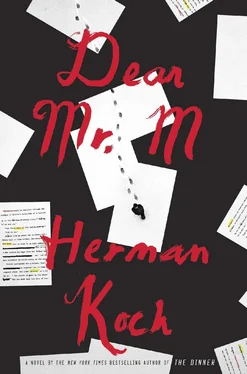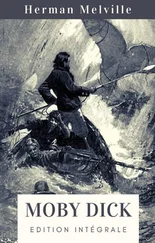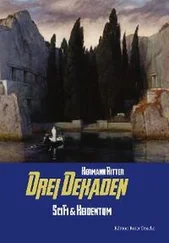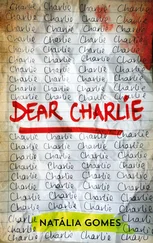M imagined a figure: a lone figure in a pure white landscape, this same landscape in winter, the harbor cranes in the distance.
Had Jan Landzaat gone to Paris? Had he taken the train? And had he then gone into hiding with his real or imaginary friends?
And if so, why? M wondered. In order to disappear? Had he had his fill of life as a teacher? Of his life in general, his family life? Had he hoped to pin the blame for a murder that had never been committed on two innocent students?
And there M’s imagination balked, or rather: that was as far as he was willing to think about it. For his book, for the book he was already planning to write, he wanted to focus solely on Herman and Laura. On two students who had bumped off an overly obtrusive teacher. Bumped him off justifiably — this last aside applied only for the discerning listener, for those who could read between the lines. An all-too-intelligent teacher who outfoxed everyone, that was no good to him. It would make the story hard to swallow, to say the very least.
Still, he needed to know for sure. He couldn’t have reality suddenly coming along to spoil the broth. Which was why, during an interview on the Sunday afternoon cultural program, when the host asked whether he was working on “something new,” he had said that he was considering writing a book about the affair. A few months had already passed. Herman and Laura had been released on bail, due to a lack of solid evidence. They were even allowed to return to school, to make up for the time they’d missed while awaiting the results of the investigation.
“You mean a sort of In Cold Blood ?” After posing the question, the host closed his eyes and pursed his lips; he wanted everyone, including M, but above all the viewers at home, to know that he was no slouch, that he had perhaps actually even read Truman Capote’s book.
“No, not so much that,” M had replied. “Capote wrote that when the facts of the crime were already widely known. Two men rob a remote farmhouse in Kansas because they think they’ll find money there. The final take is quite disappointing. While they’re about it they murder, yes, in cold blood, an entire family. What I’m thinking about is something different. I want to let my imagination do the work. After all, we still don’t know exactly what happened during those days around Christmas, which proved so fatal to the history teacher. The investigation has reached an impasse. I’m going to look into the affair. In fact, I’ve been doing so already for a while. I don’t pretend that I’ll be able to solve the mystery, I’m thinking more along the lines of a reconstruction, up to the point where we no longer have any idea. Making use of the imagination. Fantasy. Maybe we’ve all overlooked something.”
The next day most of the Dutch daily papers had run the news, some of them even on the front page. M TO WRITE BOOK ABOUT CASE OF MISSING TEACHER, was the headline in Het Vrije Volk. A WRITER AND HIS IMAGINATION: NEW IMPETUS FOR SOLUTION OF UNSOLVED MURDER? announced both De Telegraaf and De Courant/Nieuws van de Dag .
M waited. Meanwhile, he went on writing his book. The writing went quickly; soon he had finished his first rough draft. He and his publisher decided on a publication date in the fall.
About three weeks after the interview, he found a blue airmail envelope in his letterbox. A French stamp, a Paris postmark.
Dear Mr. M, was the salutation of the letter, written on light blue airmail paper.
Jan Landzaat, history teacher at the Spinoza Lyceum, pulls on his socks and shoes. The shoes are the same ones he was wearing the day after Boxing Day, when he walked by way of the Zwin to Zeebrugge and spent the last of his cash on a train ticket to Paris.
For the first few weeks he had thought about Laura almost every day. No, not almost every day: every day, every hour, every minute. Laura’s eyes, Laura’s mouth, Laura pulling her black hair back into a ponytail and then shaking it loose again. Laura saying You shouldn’t want to do that to yourself, that time in the bike shed when he had laid both hands on her handlebars to keep her from riding off. At that last memory he groaned quietly and shook his head. I won’t bother you anymore, he said silently, but sometimes, without realizing it, he said it out loud too.
The final variation on his Plan B meant that he was no longer dead. The morning after Boxing Day, sitting on the edge of the bed, he had worked out the new version down to the minutest details, then thought it through again, checking for blank spots and loose ends, and then approved it as being exceptionally believable — all within the space of five minutes.
He would disappear. Somewhere on the road to Sluis he would shake off Herman, just like in the initial version of Plan B. But now he would no longer withdraw to a remote spot in the dunes and hurt himself badly with a stone (or piece of wood). He would not have to freeze to death. He would no longer be found and buried — it was this final image, above all, the image of his coffin in the auditorium at a cemetery, a coffin on which his daughters would place flowers and drawings ( Isn’t Daddy coming back at all anymore? No, not anymore ), that had made him change his mind.
He would only disappear. First Herman would come back to Laura with his dubious story, then both of them would have to explain that story — which would grow more dubious with each passing day — to the police. Took off? What do you mean, took off? And left his car behind? And all his baggage? Do you really believe that yourselves? Or is there something you two aren’t telling us…
Precisely how he would deal with the practical side of it, that was something he could think about later. It didn’t seem like it would be too tough, there were so many people who disappeared. He had almost no cash left, he couldn’t go to a hotel, he couldn’t call anyone: no, he literally had to disappear from the face of the earth. A few months, half a year, a year…He would see how it went. Herman and Laura would be indicted, even though there was no evidence, no body, but still, everything pointed clearly in their direction. From a distance he would follow the course of the investigation, he would have to go somewhere where he could buy Dutch newspapers, no further than Belgium or France — and suddenly he thought of Paris.
For those closest to him (for his daughters — his wife could go fuck herself!), he would only be missing. Everything would seem to indicate that he had been murdered, true, but as long as no body was found the hope — however slim — of a happy ending would remain alive. The proverbial glimmer.
After those six months (or that year) he would come back. He would report in somewhere. Amnesia. He would feign amnesia. Not for too long, he probably wouldn’t be able to keep up the act for more than a few days. When he was reunited with his daughters (with his wife, who would tearfully forgive him for everything), his memory would return by fits and starts. Daddy! Daddy! He would raise his eyebrows, frown. Yes, it’s coming back to me…something is coming back…
A week later his memory would have returned almost completely. By then he would remember how he and Herman had hiked to Sluis. Then nothing else, not for a long time, until he finally woke up in the snow, half frozen to death, he didn’t know what had happened, hit while his back was turned and left behind for dead, perhaps? He really couldn’t remember. Then, for a long time again, nothing. He had walked, yes. Walked and walked. Then another huge gap in time, a vague memory of a bridge over the Seine. What do you think, Doctor? What could have happened to me?
Читать дальше












